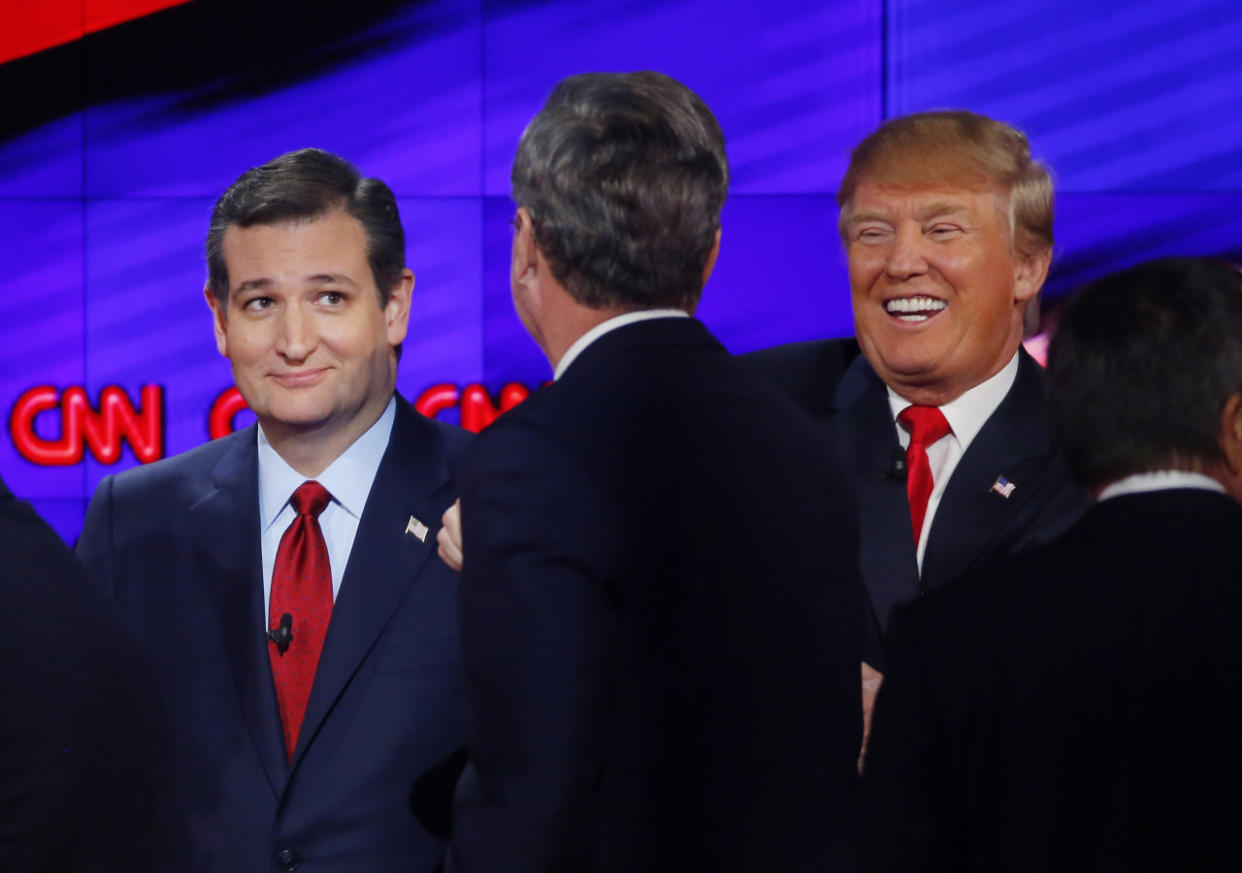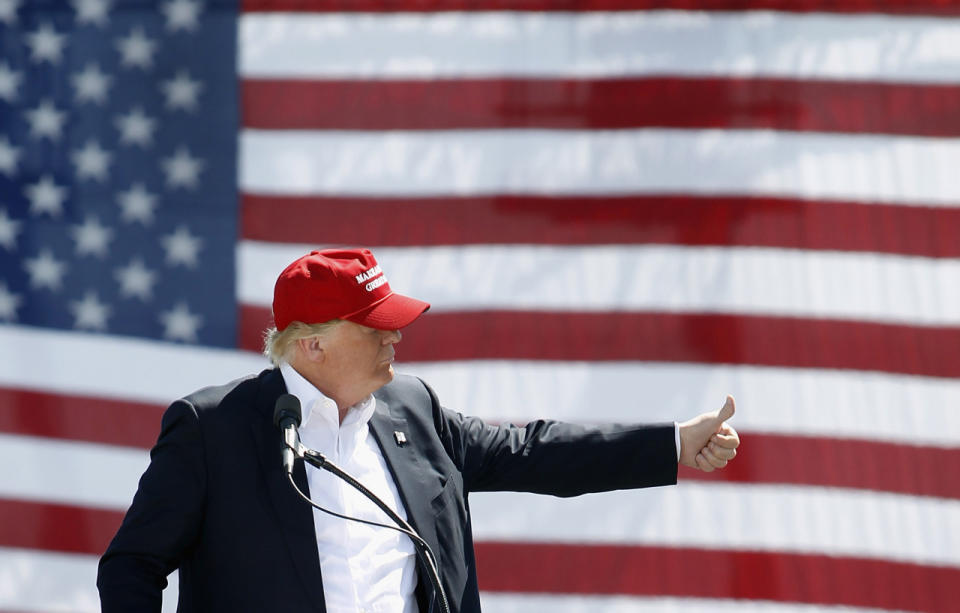Trump wins Arizona, but Cruz captures Utah and a Jeb Bush endorsement

Ted Cruz, Jeb Bush and Donald Trump at the Republican presidential debate in Las Vegas in December. (Photo: Mike Blake/Reuters)
Donald Trump easily won Arizona’s Republican presidential primary Tuesday, adding another key winner-take-all state in his push toward the GOP nomination. But Texas Sen. Ted Cruz picked up a win in Utah, nearly countering Trump’s gains, and also won the endorsement of a former rival, ex-Florida Gov. Jeb Bush, bolstering his bid to be the party’s chief alternative to Trump.
In a statement early Wednesday, Bush, who quit the race after the South Carolina primary, praised Cruz as a “consistent, principled conservative” who is the party’s best chance at capturing the White House. In doing so, he became the most prominent member of the GOP establishment to back Cruz, who has presented himself as the only candidate who can stop Trump from winning the Republican nomination.
That argument appeared to work with Bush, who had also been courted by Ohio Gov. John Kasich and Florida Sen. Marco Rubio — his former protégé who exited the race last week after losing his home state. In a statement, Bush called on Republicans to unite behind Cruz, sharply criticizing Trump, whose insurgent campaign effectively ended his own presidential aspirations.
“For the sake of our party and country, we must move to overcome the divisiveness and vulgarity Donald Trump has brought into the political arena, or we will certainly lose our chance to defeat the Democratic nominee and reverse President Obama’s failed policies,” Bush said. “To win, Republicans need to make this election about proposing solutions to the many challenges we face, and I believe that we should vote for Ted as he will do just that.”
Bush’s backing came as Cruz seeks to gain momentum from Tuesday’s win in Utah. By capturing at least 50 percent of the vote in Utah, Cruz won all 40 delegates at stake, slightly offsetting Trump’s 58 delegates in Arizona. If no candidate had exceeded 50 percent, the delegates would have been awarded proportionally, a significant loss for Republicans scrambling to stop Trump from securing the party nomination ahead of what increasingly looks like a contested GOP convention this summer.
Trump now has 739 delegates, compared to Cruz’s 465. Kasich is a distant third, with just 143 delegates. A candidate needs 1,237 delegates to secure the nomination.
As Utah Republicans headed to caucus, Trump unleashed a familiar Election Day play, slamming Cruz for dirty campaigning. On Twitter, Trump accused the Texas senator of using a provocative photo of his wife, Melania, in an ad attacking his campaign.
“Lyin’ Ted Cruz just used a picture of Melania from a GQ shoot in his ad,” Trump wrote. “Be careful, Lyin’ Ted, or I will spill the beans on your wife!”
The ad the New York real estate mogul was referring to was actually paid for by an anti-Trump super-PAC called “Make America Awesome.” The online spot, aimed at Mormon voters in Utah, featured a January 2000 photo of the then-model posing nude on a bearskin rug on her future husband’s plane for British GQ. “Meet Melania Trump. Your next first lady,” the super-PAC ad read. “Or, you could just support Ted Cruz on Tuesday.”
Responding to Trump’s tweet, Cruz denied involvement with the ad and slammed him for threatening his wife. “Pic of your wife not from us,” he wrote. “Donald, if you try to attack Heidi, you’re more of a coward than I thought.”
The social media bickering between Trump and Cruz marked the end of an election day that was largely overshadowed by the terrorist attacks in Brussels. At least 30 people were killed and more than 200 injured in a series of explosions at the airport and at a subway station in the heart of the Belgian capital. The Islamic State took credit for the attacks.
Trump quickly seized on the event to reiterate his call to close the U.S. borders to Syrian refugees, and he doubled down on his call for terrorist suspects to be subject to waterboarding and other severe interrogation measures. At the same time, Cruz called for stricter surveillance of Muslim communities in the United States, urging law enforcement to “patrol and secure” such areas “before they become radicalized.” In response, Trump told CNN he agreed with Cruz’s position, but touted himself as the candidate who would do the most to protect the nation.
At the same time, Trump, who made no public appearances on Tuesday, took to Twitter, talking up his tough stance on terrorism. “I have proven to be far more correct about terrorism than anybody — and it’s not even close,” he wrote. “Hopefully AZ and UT will be voting for me today!”

Donald Trump throws a thumbs-up to supporters during a campaign rally Saturday in Fountain Hills, Ariz. (Photo: Ralph Freso/Getty Images)
Because there were no exit polls in either Arizona or Utah, it was not clear whether the deadly attacks had had any impact on driving voters to the polls — although both states reported historic turnout.
Heading into Tuesday, Arizona was one of the last big winner-take-all states on the Republican map. Although Trump had been heavily favored there, Cruz, who has sought to cast himself as the chief alternative to the brash New York businessman, tried to put the state in play. He poured money into last-minute ads and maintained a busy schedule there compared to Trump, who has noticeably scaled back his travel in recent days.
But Trump’s anti-immigration platform — one of his key promises has been to erect a wall along the U.S.-Mexico border — and a list of key endorsements, including from Maricopa County Sheriff Joe Arpaio, a controversial figure who has been one of the country’s most outspoken opponents on immigration, proved hard to beat.
From here, the pace of the race slows a bit. Republicans aren’t scheduled to vote again until April 5, when voters in Wisconsin head to the polls. After that, a string of states in the Northeast, where Trump has bragged he can run the table, are up — including New York on April 19 and a slew of mid-Atlantic states, including Pennsylvania, Maryland and Delaware, on April 26.
Skipping his usual election night press conference on Tuesday, Trump used Twitter to try again to sound a unifying tone, as he has after his string of victories in recent weeks. “Hopefully the Republican Party can come together and have a big WIN in November, paving the way for many great Supreme Court justices!” he wrote.


